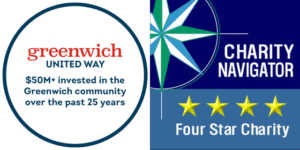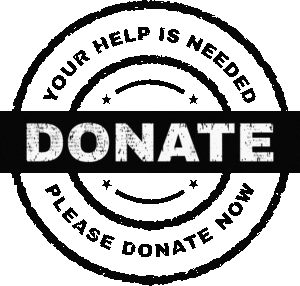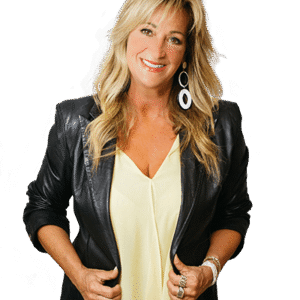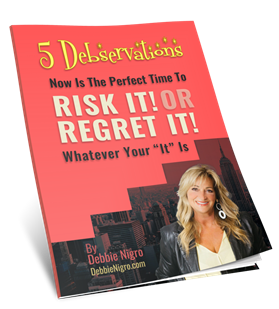Year-End Giving Reminder:

The last few weeks of the year are when most charitable giving happens — people feel more generous, tax benefits kick in for those who itemize, and many folks use year-end bonuses or appreciated stock to support causes they believe in. It’s the perfect moment to make a meaningful impact, especially with an organization that stretches every donor dollar farther than you ever could on your own.

Why United Way Might Be One of the Smartest Ways to Give
Back To Business Monday
You know how I like to start a Monday: a little caffeine, a little optimism, and a whole lot of “let’s get back to business.” And today’s business? The business of helping people — and why the United Way may be one of the most effective ways to do that in your own backyard.
I sat down with David Rabin, CEO of the Greenwich United Way, and even though we talked about his local chapter, the lessons apply EVERYWHERE — because what he shared is an example how United Ways across the country (and the world!) operate.

The Big Picture:
United Way is a massive global network with:
• 1,200 local United Ways
• Serving 1,800 communities
• Across 40 countries
Each community has its own United Way chapter focused on local needs — and that local focus is what makes the entire model powerful.
Why United Way Might Be a Better Choice Than Donating to One Charity Directly
This was the “aha!” moment for me — and it applies no matter where you live.

1. United Way does the homework you don’t have time for.
They review each nonprofit’s tax returns, audited financials, budgets, spending, and program data with a fine-tooth comb. They uncover inefficiencies and issues most donors would never spot.
2. They maximize your impact by giving where the greatest needs actually are.
Local needs change constantly — mental health, childcare, housing, literacy, food insecurity — and United Way chapters run formal needs assessments to know exactly where donor dollars matter most.
3. One donation supports the entire ecosystem of help in your community.
Instead of supporting one organization, your gift can strengthen dozens of essential local programs — the ones people rely on when life gets hard.
4. They build solutions when none exist.
For example, in Greenwich, CT the local United Way partnered with the hospital to create a youth mental-health program where no such resource existed before. That kind of long-term, structural change is happening in communities all over the country.

A Greenwich, CT Example That Applies Anywhere
David shared that even in a wealthy town like Greenwich, nearly one-third of residents are living in poverty or are one paycheck away from trouble. Surprising, right?
That’s the point.
Every community — even the ones that look well-off — has people struggling quietly.
United Way chapters exist to find those hidden needs and do something about them.

A Final Thought from Your “Dealer in Hope”
I love shining a light on the people doing good in the world and this conversation was a beautiful reminder that real impact doesn’t happen in headlines — it happens in communities, one need at a time.
Wherever you live, your local United Way is probably out there doing the heavy lifting you never see… making sure kids can read, families can access mental-health care, seniors have support, and struggling neighbors get help before they fall through the cracks.
So, if you’re thinking about year-end giving — and wondering who deserves your “deductible dollars” — United Way might be a pretty great place to start.
To learn more about United Way in your community:
unitedway.org
If you want to learn more, donate, volunteer, or get involved in the Greenwich, CT United Way:
greenwichunitedway.org
203-869-2221
And to hear the full conversation with David Rabin, CEO Greenwich United Way click play on the podcast and soak up the good energy. If you’d rather read than listen the transcript of the audio is below.
Audio Transcript:
It’s time for the Debbie Nigro Show with Debbie Nigro, who says she’s still a babe, or at least she thinks she still is. That’s right. Attitude is everything, and Debbie’s delusionally young. No one sees the glass of Cabernet half full like Debbie. She’s fresh air with a magnetic flair. Some day has arrived, and as far as she’s concerned, it’s time to roll.
0:00:25
(Speaker 2)
Back in action here, kids. Hi, Debbie Nigro here once again on a Monday. And you know what I like to do on Mondays? I like to get back to business, which is really hard. After a whole weekend, especially with Halloween and you know, if you have a family and you probably stepped up your game a little bit either Participated or enjoyed other people’s kids or maybe not shut the door shut the lights, you know I know some of you people did that. Anyway, I was party grandma.
0:01:21
(Speaker 2)
I got dressed with the last -minute costume in my closet and which nobody was surprised about because it’s a little like Halloween in there every day. I mean like I own boas and you know like sparkly things and brooches and by the way those are in we’ll talk about them. And up the wazoo on fringe. But the one thing that you didn’t see coming that I do still own that I never knew what to do with was a giant like disco ball. and I wore it around my neck because that was just like the entire like you know solidify over the boa all the kids were going wow we really like your costume I go yeah that’s great anyway as part of the the weekend you know I’m very frustrated with technology.
0:02:02
(Speaker 2)
I can’t operate my own website. I have been in podcast hell for the last week trying to find my podcast. I had a nice girl trying to help me. She had all the wrong buttons. I don’t know what happened. I’ve got every support team on the planet and there’s no humans, which really frustrates me.
0:02:17
(Speaker 2)
You can’t get a human unless – you can pay for a human. I did pay for the human, but still it won’t talk to you. I was like, really? Anyway, in case you check my website today, debbieneyegrove . com, all my podcasts are missing from all my podcasts because of some plug -in. Who are you going to call?
0:02:36
(Speaker 2)
There’s a big organization I’m going to focus on today that helps everybody with everything except this, okay? It’s called the United Way and David Rabin who’s the CEO of the United Way of Greenwich is sitting in the studio with me today. He’s very charming and they help so many people and so many people don’t even know what the United Way does and as I started to learn about it because this guy has raised like millions and millions of dollars to help millions of people with problems and challenges in the community but that happens every day all over the country with every United Way and I just think we need to appreciate it more. Welcome to the studio David.
0:03:12
(Speaker 1)
Holy smokes, why did it take so long for me to get on this show?
0:03:17
(Speaker 2)
Great to see Bob Debbie you finally thanks for having me on the show We’ve got a chance to meet and we never met in person. We were virtual I tried to sell you on an idea that I think it still has a lot of merit which I love which is the book vending machines for the schools, which is increasing the literacy amongst kids and Yeah, I met the new Chamber of Commerce had Andrea Bloom terrific girl and when I said to her so what do you think about this idea because I I’m a crack addict for helping people who are doing good for the world. And I think this book vending machine is increasing the quality of life for so many kids because reading is the thing. So I said, who should I talk to? And she said, oh, you have to call David Bowie. Rabin.
0:03:55
(Speaker 2)
I was like, Okay, so I did. Here we are.
0:03:58
(Speaker 1)
Well, that was kind of her to think of me in the Greenwich United way. You know, the need certainly is in Greenwich. And really, when people hear Greenwich before the word United Way, Well, what could possibly be the need in Greenwich?
0:04:11
(Speaker 2)
Right. I think that’s a fair assessment.
0:04:12
(Speaker 1)
Well, for the last 10 years, I was in banking before this.
0:04:14
(Speaker 2)
Yeah, I read your whole history. Pretty smart guy.
0:04:16
(Speaker 1)
Well, no, not at all. The dumbest person in the room, including this one, by the way.
0:04:20
(Speaker 2)
I don’t think so.
0:04:21
(Speaker 1)
I’ve known Bob a long time, and I certainly know that to be a fact when I’m in any room. But anyway, moving on. So the Greenwich United Way, for 90 -plus years, has been uncovering unmet needs, raising awareness and support. and developing lasting solutions, many of which you know of. So let’s start with TAG. You’ve heard of TAG?
0:04:40
(Speaker 9)
Or Ableis?
0:04:41
(Speaker 1)
You’ve heard of Kids in Crisis? You’ve heard of Riverhouse? And scores more of organizations and programs that the work of the Greenwich United Way has uncovered that need, and those lasting solutions I talked about a second ago are still here.
0:04:56
(Speaker 2)
So you go out and raise money from the community per initiative? Like, right now, I know there’s something going on with the food insecurity. You guys are raising money for that, right?
0:05:07
(Speaker 1)
Well, that’s a good point. So we have two lines of business, Debbie. Grantmaking, which is called our Community Investment Process, CIP. I invite anyone listening to give us a call and volunteer for that. It’s a volunteer -led initiative. Every year, we raise funds through our annual campaign for that first line of business, grantmaking.
0:05:25
(Speaker 1)
Now, I’ll get to the second line. Well, the second line, I’ll tell you right now, and then we’ll talk about each one. So the second line of business is our own programming, which I’m happy to talk about in a second as well.
0:05:34
(Speaker 2)
Is this what every United Way does, or is this specific to you? this area?
0:05:37
(Speaker 1)
Every United Way is a little different, right? We are, we, we, and another good question I’d like to let everybody know that we are, our catchment area is only Greenwich.
0:05:49
(Speaker 2)
That’s awesome. focus on, okay.
0:05:51
(Speaker 1)
That’s it. We raise funds in Greenwich. I can’t go anywhere else and raise funds. That might surprise some folks. I can’t go to Westchester because there’s United Way there. I can’t go to Stanford.
0:06:00
(Speaker 1)
There’s United Way there. Many are much larger than us because they have several towns in their catchment area or they’re county -wide.
0:06:09
(Speaker 2)
You call them catchment area?
0:06:10
(Speaker 1)
Catchment. Catchment area, yeah. So United Way worldwide, there’s about 1 ,200 United Ways and we pay dues. to be a United Way. So that’s how we get to use the brand and everything else.
0:06:21
(Speaker 2)
So you’re like licensing the United Way brand in a weird way.
0:06:25
(Speaker 1)
I would say that’s it. In 1933, we were the Greenwich Community Trust and Council. In 1975, we became a United Way, but the work continues. Now, Helen Wilshire Walsh founded the Greenwich Community Trust and Council in the middle of the Depression, 1933. She raised $192 ,000.
0:06:45
(Speaker 2)
That’s a lot of money back then.
0:06:46
(Speaker 1)
What do you think that is today? Tell me.
0:06:48
(Speaker 2)
It’s about $4 million.
0:06:49
(Speaker 1)
Wow, she was very forward.
0:06:50
(Speaker 2)
Way ahead of her time.
0:06:51
(Speaker 1)
Way ahead of her time. So that lasted until 1975, and then got the United Way name associated with us, and we’ve been a United Way ever since. So those two lines of business, grantmaking, I’m going to tell you this. Both lines of business, grantmaking and programming, are why you give to the Greenwich United Way. But the first one, the grantmaking side, Yeah, what kind of grants do you get? Well, we fund that through our annual campaign, which everyone in town has already received the solicitation, I’m sure, in the mail.
0:07:19
(Speaker 1)
If you haven’t, you will. And if you haven’t, give me a call. I’ll make sure you get one. Because that funds our grants. Now, when I first arrived at the Greenwich United Way from banking 10 years ago, I said to myself, why wouldn’t I give directly to the organization that – we get about 35 grant requests a year. And we budget close to a million dollars for it.
0:07:40
(Speaker 1)
But why wouldn’t I give directly to one of the 35 organizations, right? Here is the reason. This is the reason. We do the work so you don’t have to, period. When a grantee sends in their information, and the process opens in January, February time frame and runs to like April, May, and I said, volunteer led, if you want to help with this, give us a call. We’re happy to get you trained and show you what to look for.
0:08:07
(Speaker 1)
Every organization has to submit their 990, which is their tax return, their audited financials, a budget for the program they’re applying for, and the overall program budget. And that documentation is gone through over with a fine -tooth comb. I mean, we find things that would surprise even you and anyone else listening that I won’t get into right now.
0:08:29
(Speaker 2)
But when you find out some things in how dollars are spent, why dollars are spent certain ways, what admin charges are, fundraising charges are, what program expense charges are.
0:08:40
(Speaker 1)
It’s a lot of nitty -gritty that the average person wouldn’t know about. And if you want to give to an organization that does anything that they do, which is great in town, you can do that.
0:08:51
(Speaker 2)
But when you give to the Greenwich Standard Way, you 100 % ensure your donor dollar has the greatest impact possible on the people of Greenwich. And then, of course, there’s a great tax benefit to those who are donating, right?
0:09:04
(Speaker 1)
That’s write -off. Sure, talk to your tax accountant about that, your tax lawyer, but it depends. That all depends on your situation, certainly. So that’s the grant -making side of our business at a really high level view. But the reason you give to the annual campaign of ours is you make sure you can rest assured that that donor dollar has the greatest impact on Greenwich residents.
0:09:26
(Speaker 2)
By the way, when you look at our website… That’s okay, we’re just going to break.
0:09:29
(Speaker 1)
You’re not going anywhere. Okay, we can take a break.
0:09:31
(Speaker 2)
Bob’s at the music. Where were you, so we come back exactly where you left off?
0:09:37
(Speaker 1)
Oh, he’s now hearing me. I don’t have my headphones on.
0:09:39
(Speaker 2)
I’ll know where to come back to. Well, you’ve got a busy job every day helping so many people. I’m sure it brings you great personal satisfaction to see the impact, right? We’ll talk more about specific things you do. We’re just chatting today. I’m back to business Monday.
0:09:53
(Speaker 2)
You know, the business of giving is serious business, and lots of people are in philanthropy and lots of organizations around. I’m pretty sure everybody listening has heard about the United Way, and I’m also pretty sure not everybody knows exactly what the United Way does, even though they’ve been around forever. So taking a minute today with David Rabin, the CEO of of the Greenwich United Way here in the studio with me today, which is kind of nice to have company. I love having company here on the Debbie Nigro Show back in just a bit. I hope you believe me when I say I show up here because it makes me feel good to hang out with you guys, hopefully sharing information that gives you a little education, a little commiseration, a little optimism. You know what I call myself, right?
0:10:56
(Speaker 2)
A dealer in hope. I am. Hi everybody. I’m Debbie Nigro in studio today back to business Monday with another very high energy, good energy guy. I love good energy. David Rabin who is the CEO of the Greenwich United Way.
0:11:10
(Speaker 6)
It’s the business of helping others.
0:11:12
(Speaker 2)
It matters. Everybody is trying their best, good people anyway. If you don’t know, the United Way is an international network, okay? It’s not just here in Greenwich, Connecticut, and they support like 1 ,800 communities, 40 countries. The mission is to improve lives and strengthen communities around the world every single day. So David Rabin, who’s the president and CEO of Greenwich United Way.
0:11:35
(Speaker 2)
kind of sharing with us like how they work, right? What do they do?
0:11:39
(Speaker 1)
And we left off with? Our needs assessment and how we find out everything we should be doing in the town of Greenwich.
0:11:46
(Speaker 2)
Every five years we do a needs assessment, Debbie, and that is the statistical portrait of the human services needs of the town. Okay, so, again, you said it first.
0:11:55
(Speaker 1)
People here in Greenwich, Connecticut, like, what could they possibly need in Greenwich, Connecticut? Let’s get to that. And certainly the needs assessment is what tells us. It drives us.
0:12:05
(Speaker 2)
tells us, you know, what the need is, the top needs, and we address them for three to five years, and then we do another needs assessment five years later.
0:12:12
(Speaker 1)
What’s the top need? Well, we’re in the throes of 2025s right now, so we should have that finished by the end of the first quarter of 2026 for release. But what we’re looking at are sort of the same issues from 2020, which we had to cut short a little bit because of COVID. So, in 2020, the top needs were early childhood education, Remember, this is just Greenwich. Mental health, youth and adolescent mental health, and affordable housing. So I told you some things before about what we did decades ago and how those lasting solutions are still here, but what have we done for Greenwich lately?
0:12:51
(Speaker 1)
Let’s talk about that. So for the youth and adolescent mental health, top need.
0:12:56
(Speaker 2)
About three years ago, two and a half years ago, I went to Diane Kelly, CEO of Greenwich Hospital at the time, since retired, and said, Diane, The needs assessment tells us that this is a major issue, teen mental health, youth and adolescent mental health.
0:13:10
(Speaker 1)
Absolutely. Her eyes went like this, whoop, like that. Since I got here, because behavioral health is a big focus of hers, and she goes, I’ve wanted to do something, what do you got? I go, well, you know what, we’re leaving 500 West Putnam where our office was next to Citarella, everybody knows where Citarella is, that means you know where 500 is. The big greenish type building there. We’re moving
0:13:30
(Speaker 1)
from there. We’re moving to a new space. Let’s take our space, the space next door, which was a finance firm that moved out during COVID, never came back. We’ll demise the space. We’ll put it together and build for you in Greenwich. Doesn’t exist.
0:13:44
(Speaker 2)
a youth and adolescent mental health intensive outpatient program.
0:13:47
(Speaker 1)
Oh, that’s fantastic. So fast forward to her high, again, she went, go for it. Now, what we did there was we kind of did a little reversal and I kind of, you know, bent our rules a little bit in that we normally, for our campaign fundraising, we fund grants that focus on programs. We don’t do, not going to fix a sidewalk, not going to give you money to build a room.
0:14:08
(Speaker 2)
But for this particular situation, we made an exception. It’s so important.
0:14:13
(Speaker 1)
Having been a parent, and I’m now a grandparent, and friends with many other parents whose kids, through the growth process, had all kinds of problems, I can tell you there’s nothing more terrifying than if your kid isn’t suffering and you don’t know where to get help. Well, here’s where this comes into play. So we raised almost a couple of million dollars to do the build -out, bypassed a lot of red tape through Yale New Haven and things, maybe I shouldn’t be saying that on the air, but I am, because it got done quickly, efficiently, which is how we work. Stuff we do is always data -driven and research -based, just so you know, and I’ll get to that for our programs in a second. So overnight, almost overnight, and Yale New Haven raised the funds to run the program for four years, because year five is supposed to break even, right? So they don’t have to worry about paying anybody for four full years.
0:15:05
(Speaker 1)
Today, overnight, two years in the making, two and a half years, there’s a facility in town, an IOP, that in the past, if, and this is what we do, we did all our due diligence, if you called for your daughter or granddaughter, whoever it was, 10 years old has an issue, 13, 14 years old, sure, I can see them, you call a provider, I’m private pay, no insurance, no Medicaid, no Husky.
0:15:28
(Speaker 2)
And I have, let me check my calendar, six months from now I have an opening. I gotcha.
0:15:32
(Speaker 1)
That’s what’s going on in the world right now.
0:15:34
(Speaker 2)
So that’s what made us do this.
0:15:35
(Speaker 1)
Yeah, this is unfortunately what’s going on with every communication for anybody looking for help. So overnight, I use that in air quotes, right, there’s a facility in Greenwich that would not be here.
0:15:46
(Speaker 2)
without the work of the Greenwich United Way, that is budgeted to handle 400 children a year. That’s awesome.
0:15:52
(Speaker 1)
Do they have to be residents of Greenwich?
0:15:53
(Speaker 2)
No.
0:15:54
(Speaker 1)
That’s really important to know. I mean, I get data, not any names or anything, from Greenwich, from Yale New Haven Greenwich Hospital on the number of people being seen. You know, it just opened last December, so it’s coming up on a year. So the first quarter data was kind of flat because it was Christmas and holidays and school was closed. But then that second quarter report, it just hockey -sticked, right, up the number of people they were seeing. And also what I wanted to see was people on Husky and Medicaid, right, being helped.
0:16:23
(Speaker 2)
because the providers just don’t take it, and that’s fine, they can do whatever they want. It seems that that category of help, the mental health, emotional help, is one that, you know, it’s hard to have an insurance cover for some reason, and that it’s the number one topic that, you know, tortures people to find solutions to.
0:16:40
(Speaker 4)
I think you should do a PSA on this radio station just about that organization.
0:16:45
(Speaker 8)
We could do that.
0:16:46
(Speaker 1)
Yeah. What a good idea.
0:16:47
(Speaker 2)
Yeah.
0:16:52
(Speaker 1)
Next logical step then, so this year we partner with YMCA, with Liberation Program, you know Liberation? I do not. Well, they’re out of Norwalk, but they have a lot of presence in town. They go up the line a lot, but they have different, they’re a mental health and addiction services organization, pretty large. So we picked them as a partner, picked the YM as a partner, put a new program at the YM that we funded, Greenwich United Way funded, called Greenwich Connects.
0:17:18
(Speaker 2)
It just launched in July.
0:17:21
(Speaker 1)
and it’s for 18 to 25 year olds.
0:17:22
(Speaker 7)
Ah, you see, you have to let more people know about this.
0:17:24
(Speaker 1)
To walk in, yeah, it’s getting out there now.
0:17:27
(Speaker 2)
I’m glad I had you. This is why I’m here.
0:17:29
(Speaker 1)
All right, I’m glad you came in. This is important.
0:17:32
(Speaker 2)
cohort of people now. There’s a facility in town, a resource in town, for them to walk in without an appointment, by the way, to the YMCA, ask for this service, and there’ll be a trained person there to help you. Is this something that, when you do a program like this, it’s so right on?
0:17:50
(Speaker 1)
Do others around the country and the world want to replicate your programs? I mean, do you go to some, like, big United Way gathering and say, oh, here’s a breakthrough idea we had that you might want to emulate? Well, that’s a good question.
0:18:03
(Speaker 2)
There are annual conferences for United Way worldwide, UWW it’s called. I have never gone to one yet.
0:18:12
(Speaker 1)
You should take this on the road. This is a good one, David. As far as programming goes, so our own programming, I got a call from somebody who has a daughter in Virginia who wanted to talk about a Reading Champions program.
0:18:26
(Speaker 6)
Now, I can talk about that.
0:18:28
(Speaker 1)
In fact, is it time now to talk about our programming? Sure, it’s your time. So grant making, one side of the business we talked about, right? We do the work so you don’t have to. We’ll uncover stuff that you’ll have no idea. If you want the best impact for your donor dollar, it’s through our annual campaign, period.
0:18:44
(Speaker 1)
The other side of our program, business, our own programming includes several, and one is Reading Champions, and that’s kind of our flagship -type program because it’s been here for 15 years, been with us for 15 years, and it is a reading fluency model based on a platform called Read Naturally. We’re embedded in every Greenwich Public Elementary school, 11 sites, five after -school sites. It’s a reading fluency improvement platform, and it’s a one -on -one, so we have 100 students trained reading champion tutors out there in the field every day from October to May, one -on -one basis, going into the schools, improving the children’s reading fluency, again, in a data -driven, evidence -based way. This program is very evidence -based.
0:19:29
(Speaker 2)
And I have the data from last school year that shows that 100 % of the children in the program, about 400 every year, by the way, 400 kids go through the program every year, all these sites.
0:19:40
(Speaker 1)
And 100 % of them have improved their grade level reading fluency 100%. That’s a big number. Another one is the tutors will come back and keep coming back.
0:19:51
(Speaker 2)
They love what they do.
0:19:52
(Speaker 1)
I think the tutors get as much out of it as the children do, by the way. Yeah, it’s great.
0:19:56
(Speaker 2)
Because the tutors, here’s what a Hamilton Avenue kid said years ago about her reading champion tutor. She said, I wish my reading champion tutor could come home with me and be my grandmother forever. Aw, that’s nice.
0:20:12
(Speaker 1)
We don’t want to knock out the grandmas though. Okay, that’s nice. It’s a literacy improvement, but it’s also a mentorship program at the same time that kind of underlies the reading fluency improvement. there may be nobody reading to these children.
0:20:26
(Speaker 2)
And they’re identified at the schools by the literacy specialist. So if they’re not identified, and we’re not there to fill this need, they’re not getting the help they need, and their reading scores aren’t going up.
0:20:36
(Speaker 1)
We live in a very difficult time for parents in general right now, just trying to keep up with being a parent, trying to earn, trying to pay for everything. A lot of them are wiped out trying to keep up with the idea of reading to their kids.
0:20:47
(Speaker 2)
Heck yeah. And many of those kids that we’re talking about are in the Title I schools and et cetera, et cetera, where they may have one parent who can’t read to them because they’re working to get jobs or whatever it is. Here’s a stupid question. You ready for this one? Years ago back on Halloween, years ago back on Halloween, half my fun of going out was not only getting candy, but getting my little UNICEF box filled with money that I’m so excited to bring to school because I wanted to get the most money.
0:21:13
(Speaker 2)
And you know, of course, UNICEF was an organization that kids helped raise money for.
0:21:18
(Speaker 1)
Why hasn’t the United Way picked up on that idea and send kids out with little United Way boxes? What’s missing on that, Link? Well, I think times have changed. My opinion would be times have changed, and kids knocking on doors asking for cash just doesn’t cut it anymore, I don’t think.
0:21:33
(Speaker 2)
I think times are different. I did the same thing, knocking on a door, give me some pennies for my UNICEF box.
0:21:38
(Speaker 1)
Pennies, right? Pennies are dead anyway.
0:21:40
(Speaker 2)
They don’t make them anymore.
0:21:42
(Speaker 1)
So I think that has something to do with it, for sure. But kids love to get involved and win challenges.
0:21:50
(Speaker 2)
Well, then here you go.
0:21:51
(Speaker 1)
The Greenwich Junior United Way has high school and middle school cohorts now. Okay, cool.
0:21:56
(Speaker 2)
We just started launching the middle school cohort now just this year and it’s been going great.
0:22:02
(Speaker 1)
We have about 55, 60 kids in the Greenwich Junior United Way high school program and 30 or so in the middle school program. Volunteering? They come up with volunteer projects. They come up with philanthropy ideas. They meet and they talk about how they want to run the program for the year.
0:22:18
(Speaker 2)
One of the big things they do is Together We Shine with Ableis.
0:22:22
(Speaker 1)
Have you ever heard of that?
0:22:23
(Speaker 5)
Go ahead, articulate it.
0:22:25
(Speaker 1)
Together We Shine is a prom type event for Ableist’s clients where Ableist’s clients get all dressed up in their finery and our kids get dressed up in their prom clothes and there’s a red carpet and decorations and Ableist’s clients get off their bus and they come walking down and the kids take pictures like paparazzi.
0:22:44
(Speaker 2)
I love this. Food, dancing, it’s a great fun night and the clients, when you see the look on their faces, you better bring some Kleenex with you because you’re gonna be teared up. Yeah, this is good stuff, Dave.
0:22:55
(Speaker 1)
So you must feel very – like time well spent in your new next level career. How do you come out of banking to this? Time well spent is a great word. put it. Now the needs of Greenwich, let’s get back to that. So when you talk about how many people we help in a town of 64 ,000 roughly, people don’t understand that we focus on about 20 ,000 of those people who need the help.
0:23:19
(Speaker 2)
Now, look at the look on your face.
0:23:20
(Speaker 1)
I wish we had a podcast going. Yeah. We’re going to have that for 2026, by the way. Almost one -third of the town is that missed paycheck or some disaster away from, now how do I feed my kids? Now, how do we know that? About 8 % of the town is under the federal poverty level.
0:23:35
(Speaker 1)
You can do that math easy enough on 60 ,000 people, right? And have you ever heard of ALICE? It’s a national program. It’s been in the Journal and the Times. United Ways have been about 30 states have banded together to form the ALICE project. It’s been going on for many years.
0:23:52
(Speaker 1)
ALICE stands for Asset Limited Income Constrained Employed. There’s an old term for that that people would use, but now it’s ALICE. The old term was working poor. ALICE is today’s term, right? So that population in town is about 22 % in our catchment area. So you put those two numbers together and what do you have?
0:24:12
(Speaker 1)
Now what do you think it costs a family of four? I like to use that dynamic. So there’s two parents working.
0:24:17
(Speaker 4)
Two children in child care.
0:24:20
(Speaker 2)
What do you think they have to earn gross to survive in the town of Greenwich?
0:24:22
(Speaker 1)
The Alice survival budget is rent, food, child care. Take a guess.
0:24:27
(Speaker 2)
I don’t have one. $151 ,000 a year to survive in the town of Greenwich. No savings. All right, well we had a good time together here again. You really enlightened me.
0:24:36
(Speaker 1)
This has been great. A time well spent with you, David Raven, the CEO of United Way in Greenwich. If someone would like to get in touch with you, what is your website? Oh, www . greenwichunitedway . org, greenwichunitedway .
0:24:51
(Speaker 1)
org, 203 -869 -2221, 869 -2221.
0:24:54
(Speaker 2)
Give me a call. I talk to groups of 1, 10, 300, 500, whatever it takes to spread the word about the importance
0:25:00
(Speaker 1)
work that we do in this town to keep Greenwich the premier place it is to live, work, raise a family. Wonderful having you.
0:25:06
(Speaker 2)
Come back anytime. My pleasure. Thank you. And I like the idea of the PSA is for what stuff you’re doing that people don’t know about. All right, more to come on the Debbie Nigro Show next.



